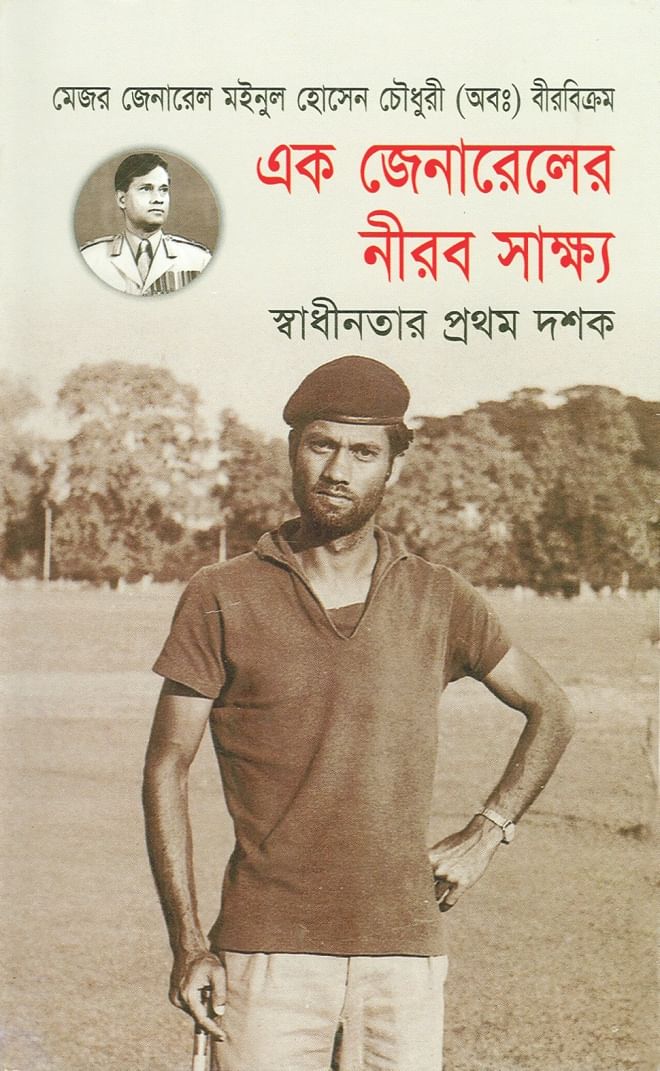Behind the curtains

EK General-er Nirob Shakhya (The Silent Witness by a General) by Major General Moinul Hossain Chowdhury 'is a gold mine of information for readers with a discerning eye. It is especially revealing with respect to General Manzur's death and how Manzur was falsely accused and deliberately slandered by General Ershad and his associates.' Lawrence Lifscultz thus wrote in this newspaper on the murder of Major General Manzur. As the Manzur murder case has become a burning issue now, this book along with a few other ones has come to prominence, which it fully deserves. Though the murder of Manzur is the kernel of this book, it has dealt with the broader issue of the nature of the Liberation War and the conflicts among high ranking army officers.
General Moin possessed a broad vision about our Liberation War. This book is not simply a military account of what happened during the war and thereafter. Though he was a high ranking military officer and always wanted to serve his country in that role, he never projected the Liberation War as only a military affair. Instead, he recognized the key role people played in determining the outcome of the war. It is clear from his account of an incident, mentioned by the Pakistani Major Salek in his book, at the Rohanpur army camp in Rajshahi. A boy with his hands tied was brought before the Pakistani major, who as a result of the failure of torture upon him tried to cajole him to reveal the whereabouts of his freedom fighter comrades. The boy touched the ground with his hands and put the soil to his lips. Then he stood upright and said, 'I am now ready for death. My blood will certainly bring nearer the freedom of my motherland.' He was taken outside and the sound of bullets split the air. Nothing more is known about this brave freedom fighter. Moin has paid his highest tribute to war heroes like this young soldier of freedom.
Major Moin along with his comrades joined the Liberation War with full mental preparation. According to him, the seeds of Bengali rebellion in the army was planted on 7 March, when sometime before Sheikh Mujibur Rahman delivered his historic speech, Bengali officers of the Pakistan army sat in the office of the Commanding Officer, Lt. Col. Masudul Hasan Khan, and decided to plunge into the War of Liberation if Bangabandhu gave a call for it. On March 19, they were certain that the Pakistani occupation army was readying itself to inflict a deadly blow on the Bangalis. At the outbreak of the Liberation War, the Second East Bengal Regiment under him with others mutinied against the Pakistani army.
Once into the war, Major Moin with the force under him alternately suffered defeats and won victories against the Pakistanis. And at last on 16 December 1971, he with all others watched the sun of Bangladesh's freedom rise on the horizon. But he felt the haughty attitude of the Indian army and watched them loot military weapons and non-military valuable goods in Bangladesh and smuggle them into India. In free Dhaka, he watched people, many armed wit weapons, moving across the city, some by car and some on foot, people whom the sun and rain seemed never to have touched during the life-and-death struggle of the nation for nine months.
Major General Moin became a silent witness to the not-so-tasteful historical events happening thereafter in his beloved motherland. The clouds of corruption, conspiracy, petty interests and political errors began to cover the sun of freedom. The formation of the Rakkhi Bahini and training of their officers in India, dissatifaction within the army, conflict between senior army officers, the anomaly in declaring gallantry awards for those who fought in the Liberation War, the rise of 'Friday Fighters' or '16th Division' who turned into freedom fighters only on 16th December and the next day (Friday), assimilation in the army of non-freedom fighter soldiers repatriated from Pakistan, the food crisis, political instability caused by the extreme left groups, etc., have been touched upon briefly but deftly.
The writer had to be a silent witness to the waste of $2.5 billion foreign aid Bangladesh received in the first three years of its freedom. He writes that this amount of aid was more than what East Pakistan received in twenty three years and West Germany received under the Marshall Plan after World War II. President Ziaur Rahman appointed General Moin as chief advisor of the Muktijoddha Sangsad, but soon he was replaced by General Ershad in that position.
Then what happened behind the assassinations of President Zia and General Manzur, 'all acts committed in the space of four days', as Syed Badrul Ahsan has phrased it, one can learn from Lifschultz's writings based in large part on Moin's book in this paper --- until one preferably reads the whole thing from Mowla Brothers' third edition of the book itself.
Alamgir Khan writes on theatre, education and socio-political issues

 For all latest news, follow The Daily Star's Google News channel.
For all latest news, follow The Daily Star's Google News channel. 



Comments